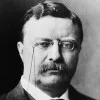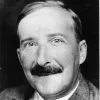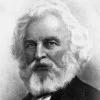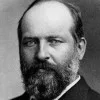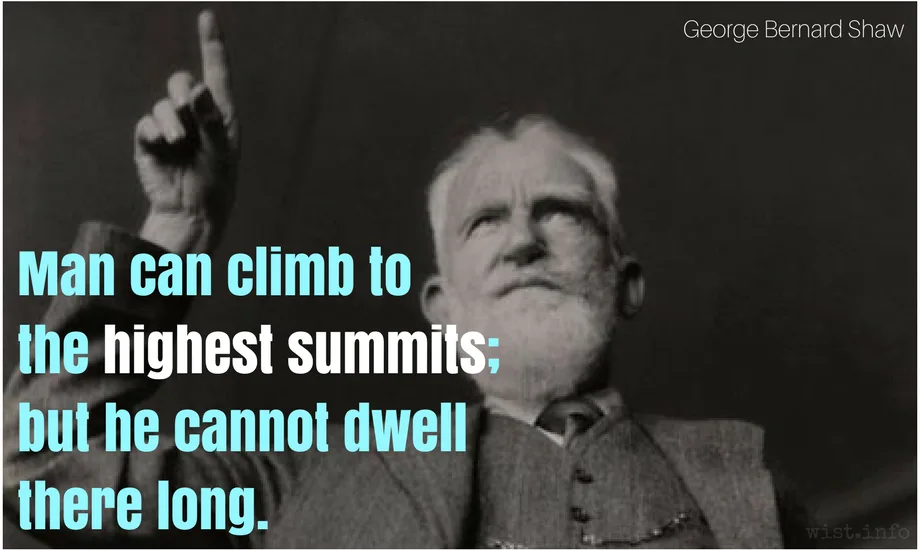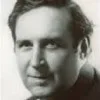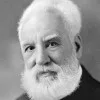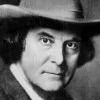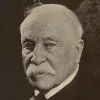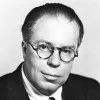When you are satisfied, you are successful. For that’s all there is to success is satisfaction.
Will Rogers (1879-1935) American humorist
Column (1928-07-29), “Weekly Article: Politics, Jackie, and a Certain Humorist”
(Source)
Quotations about:
success
Note not all quotations have been tagged, so Search may find additional quotes on this topic.
If the man works for evil, then the more successful he is the more he should be despised and condemned by all upright and farseeing men. To judge a man merely by success is an abhorrent wrong; and if the people at large habitually so judge men, if they grow to condone wickedness because the wicked man triumphs, they show their inability to understand that in the last analysis free institutions rest upon the character of citizenship, and that by such admiration of evil they prove themselves unfit for liberty.
Theodore Roosevelt (1858-1919) American politician, statesman, conservationist, writer, US President (1901-1909)
Speech (1910-04-23), “Citizenship in a Republic [The Man in the Arena],” Sorbonne, Paris
(Source)
As for me, I’d like to have money. And I’d like to be a good writer. These two can come together, and I hope they will, but if that’s too adorable, I’d rather have the money. I hate almost all rich people, but I think I’d be darling at it.
People keep working in a freelance world, and more and more of today’s world is freelance, because their work is good, and because they are easy to get along with, and because they deliver the work on time. And you don’t even need all three. Two out of three is fine. People will tolerate how unpleasant you are if your work is good and you deliver it on time. People will forgive the lateness of the work if it’s good, and if they like you. And you don’t have to be as good as the others if you’re on time and it’s always a pleasure to hear from you.
Neil Gaiman (b. 1960) British author, screenwriter, fabulist
Speech (2012-05-17), Commencement, University of the Arts, Philadelphia [14:10]
(Source)
MACBETH: If we should fail —
LADY MACBETH: We fail!
But screw your courage to the sticking-place,
And we’ll not fail.William Shakespeare (1564-1616) English dramatist and poet
Macbeth, Act 1, sc. 7, l. 68ff (1.7.68-71) (1606)
(Source)
The sticking-place on a crossbow was where the bowstring was screwed or wound to prior to its bolt being shot.
The line was most famously revived by Howard Ashman in the lyrics to "The Mob Song [Kill the Beast]" in Beauty and the Beast (1991). Lin-Manuel Miranda also included the line (amidst many other Macbeth references) in Hamilton (2015), in the song "Take a Break."
The thinker sees his own actions as experiments and questions, as seeking explanations of something: to him, success and failure are primarily answers.
[Der Denker sieht in seinen eigenen Handlungen Versuche und Fragen, irgend worüber Aufschluss zu erhalten: Erfolg und Misserfolg sind ihm zu allererst Antworten.]Friedrich Nietzsche (1844-1900) German philosopher and poet
The Gay Science [Die fröhliche Wissenschaft], Book 1, § 41 (1882) [tr. Nauckhoff (2001)]
(Source)
Also known as La Gaya Scienza, The Joyful Wisdom, or The Joyous Science.
(Source (German)). Alternate translations:The thinker sees in his own actions attempts and questionings to obtain information about something or other; success and failure are answers to him first and foremost.
[tr. Common (1911)]A thinker sees his own actions as experiments and questions -- as attempts to find out something. Success and failure are for him answers above all.
[tr. Kaufmann (1974)]In his own actions, the thinker sees experiments and enquiries from which he seeks to obtain insight: to him, success and failure are, first of all, answers.
[tr. Hill (2018)]
He that has never known adversity is but half acquainted with others, or with himself. Constant success shows us but one side of the world. For, as it surrounds us with friends, who will tell us only our merits, so it silences those enemies from whom alone we can learn our defects.
Charles Caleb "C. C." Colton (1780-1832) English cleric, writer, aphorist
Lacon: Or, Many Things in Few Words, Vol. 1, § 513 (1820)
(Source)
If well thou hast begun, go on fore-right
It is the end that crowns us, not the fight.
One should guard against preaching to the young man success in the customary sense as the aim of life. For a successful man is he who receives a great deal from this fellowmen, usually incomparably more than corresponds to his service to them. The value of a man, however, should be seen what he gives. and not in what he is able to receive.
Albert Einstein (1879-1955) German-American physicist
Speech (1936-10-15), Convocation of University of New York, Albany [tr. Arronet]
(Source)
Collected in "On Education" (1936), Out of My Later Years, ch. 9 (1950).
It takes a grate deal of money tew make a man ritch, but it don’t take but little virtew.
[It takes a great deal of money to make a man rich, but it doesn’t take but little virtue.]
Josh Billings (1818-1885) American humorist, aphorist [pseud. of Henry Wheeler Shaw]
Everybody’s Friend, Or; Josh Billing’s Encyclopedia and Proverbial Philosophy of Wit and Humor, ch. 144 “Affurisms: Gnats” (1874)
(Source)
By diligence and patience, the mouse bit in two the cable.
Benjamin Franklin (1706-1790) American statesman, scientist, philosopher, aphorist
Poor Richard (1735 ed.)
(Source)
A good education is not so much one which prepares a man to succeed in the world, as one which enables him to sustain a failure.
Bernard Iddings Bell (1886-1958) American author, Episcopal priest, chaplain, academic, lecturer
“Know How vs. Know Why,” Life Magazine (1950-10-16)
(Source)
Getting what you go after is success; but liking it while you are getting it is happiness.
Bertha Damon (1881-1975) American humorist, author, lecturer, editor [Bertha Clark Pope Damon]
A Sense of Humus, ch. 13 “Garden Sass” (1943)
(Source)
I do not think military readiness, in itself, will defeat Communism. I do not think we can consider the job finished with that. I think it buys us time to do the bigger job. We must demonstrate that it is possible to overcome poverty, misery and decay by democratic means, and that we must ourselves believe, and must show others, that our American tradition of the dignity and liberty of the individual is not a luxury for easy times but is the basic source of strength and security of a successful society.
Jane Jacobs (1916-2006) American-Canadian journalist, author, urban theorist, activist
“No Virtue in Meek Conformity” (1952)
(Source)
Foreword to her response to a State Department Loyalty Security Board interrogatory (1952-03-25). Reprinted in Vital Little Plans (2016).
In order to be well received, an actor need not be on stage all the way through the play, as long as he performs satisfactorily in the scenes in which his character appears. In the same way, a wise man need not feel that he must loiter to the very end of the very last act. To demonstrate virtue and excellent character, a short life is long enough.
[Neque enim histrioni, ut placeat, peragenda fabula est, modo in quocunque fuerit actu probetur; neque sapientibus usque ad “Plaudite” veniendum est. Breve enim tempus aetatis satis longum est ad bene honesteque vivendum.]Marcus Tullius Cicero (106-43 BC) Roman orator, statesman, philosopher
De Senectute [Cato Maior; On Old Age], ch. 19 / sec. 70 (19.70) (44 BC) [tr. Cobbold (2012)]
(Source)
Many older translators refer to the plaudite, which was was the last word of many Latin plays, particularly those of Terence and Plautus. It was basically a formal cue for the audience to applaud. Waiting for the plaudite is the same as waiting for the end of the play, the fall of the curtain.
(Source (Latin)). Alternate translations:I wolde that ye knowe that as the poete makith not onely by versys of a fable in his comedye callid an enterlude to the intente bycause that it please to hym that pleyeth it in the game. But the poete makith onely his comedye and enterlude to the ende bycause that in every pagent he be preysed and commended of every man aftir his playe. And the wise man also ought not to desire to lyve tylle that he saye "That is to witt I will no lenger of my life." For a short and a litle tyme of age is long for to lyve wele and honestly.
[tr. Worcester/Worcester/Scrope (1481)]For he that is a stage-player needeth not of necessity to be an actor in the interlude or comedy until the last end thereof (to delight the beholders), but in what act of the same soever he playeth or chanceth to be, he must so expressly handle and play his part, that he may win praise and commendation; neither should a wise man live till the plaudite be stricken up. For a short space and time of life is long enough to live well and honestly, and in whatsoever age we be in, it is sufficient to have lived therein godly and virtuously.
[tr. Newton (1569)]For a good actor is not applauded in the midst of a Scene, so a wise mans praise comes not till the end. The time of our age is short indeed; but long enough to live well and honestly.
[tr. Austin (1648), ch. 21]When a good Actor doth his part present,
In ev'ry Act he our attention draws,
That at the last he may find just applause,
So (though but short) yet we must learn the art
Of virtue, on this Stage to act our part;
True wisdome must our actions so direct,
Not only the last Plaudite to expect.
[tr. Denham (1669)]A short Space of time is long enough, if constantly employed in the Pursuit of Honour and Virtue.
[tr. Hemming (1716)]And as the Player may be applauded in every Scene, tho' to give true Satisfaction he must finish his Play; so with the wise Man, he lives approv'd by all till his last Plaudit. For the time of Man's life is short, yet it is long enough to live well.
[tr. J. D. (1744)]No Man expects of any one Actor on the Theatre, that he should perform all the Parts of the Piece himself: One Role only is committed to him, and whatever that be, if he acts it well, he is applauded. In the same Manner, it is not the Part of a wise Man, to desire to be busy in these Scenes to the last Plaudit. A short Term may be long enough to live it well and honourably.
[tr. Logan (1744)]It is in life as on the stage, where it is not necessary in order to be approved, that the actor's part should continue to the conclusion of the drama; it is sufficient, in whatever scene he shall make his final exit, that he supports the character assigned him with deserved applause. The truth is, a small portion of time is abundantly adequate to the purposes of honour and virtue.
[tr. Melmoth (1773)]For neither must a play be gone all through by a player, that he may please; it is only needful that he be approved in whatsoever act he shall have been; nor should a wise man live quite to Plaudite. For a short space of time is long enough to live virtuously and honourably.
[Cornish Bros. ed. (1847)]For neither need the drama be performed entire by the actor, in order to give satisfaction, provided he be approved in whatever act he may be: nor need the wise man live till the plaudite. For the short period of life is long enough for living well and honourably.
[tr. Edmonds (1874)]In order to give pleasure to the audience, the actor need not finish the play; he may win approval in whatever act he takes part in; nor need the wise man remain on the stage till the closing plaudit. A brief time is long enough to live well and honorably.
[tr. Peabody (1884)]An actor, in order to earn approval, is not bound to perform the play from beginning to end; let him only satisfy the audience in whatever act he appears. Nor need a wise man go on to the concluding "plaudite." For a short term of life is long enough for living well and honourably.
[tr. Shuckburgh (1895)]Our span of life is brief, but it is long enough for us to live well and honestly.
[ed. Harbottle (1906)]Why ev'n the actor to secure applause
Need not play to the end: if but he do
His best, he will be cheered: if wise, he'll stop
Before he reach the final "Plaudite."
A little time's enough, in which to live
A good and honest life.
[tr. Allison (1916)]The actor, for instance, to please his audience need not appear in every act to the very end; it is enough if he is approved in the parts in which he plays; and so it is not necessary for the wise man to stay on this mortal stage to the last fall of the curtain. For even if the allotted space of life be short, it is long enough in which to live honourably and well.
[tr. Falconer (1923)]An actor, in order to find favor, does not have to take part all the way through a play; he need only prove himself in any act in which he may appear; similarly the wise and good man does not have to keep going until the curtain is rung down. A brief span of years is quite long enough for living a good and honorable life.
[tr. Copley (1967)]An actor does not have to appear in the last part of the movie: he can earn good reviews from what he does in any part of it. And neither must life be drawn out until some venerable time for the final curtain. A short time of life is enough to live well and honorably.
[tr. Gerberding (2014)]During a drama an actor has no need
To be cheered but in the parts he plays
while on the stage of mortal life, indeed,
A man of discernment never stays
Until the last applause. A short life is always
Long enough to be lived honestly and well.
[tr. Bozzi (2015)]An actor does not need to remain on stage throughout the play. It is enough that he appears in the appropriate acts. Likewise, a wise man need not stay on the stage of this world until the audience applauds at the end. The time allotted to our lives may be short, but it is long enough to live honestly and decently.
[tr. Freeman (2016)]
That’s all there is to success is satisfaction.
And Man in portions can foresee
His own funereal destiny;
His wretchedness, and his resistance,
And his sad unallied existence:
To which his Spirit may oppose
Itself — and equal to all woes,
And a firm will, and a deep sense,
Which even in torture can decry
Its own concenter’d recompense,
Triumphant where it dares defy,
And making Death a Victory.
In our time we have come to live with moments of great crisis. Our lives have been marked with debate about great issues; issues of war and peace, issues of prosperity and depression. But rarely in any time does an issue lay bare the secret heart of America itself. Rarely are we met with a challenge, not to our growth or abundance, our welfare or our security, but rather to the values and the purposes and the meaning of our beloved Nation.
The issue of equal rights for American Negroes is such an issue. And should we defeat every enemy, should we double our wealth and conquer the stars, and still be unequal to this issue, then we will have failed as a people and as a nation.Lyndon B. Johnson (1908-1973) American politician, educator, US President (1963-69)
Speech (1965-03-15), “The American Promise,” Joint Session of Congress [06:27]
(Source)
It is not worth living,
when we see bad men unjustly honored.
[ου γαρ άξιον λεύσσειν φάος κακούς ορώντας εκδίκως τιμωμένους.]Euripides (485?-406? BC) Greek tragic dramatist
Bellerophon [Βελλεροφῶν], frag. 293 (c. 430 BC) [tr. Collard (1997)]
(Source)
Nauck (TGF) frag. 293, Barnes frag. 129, Musgrave frag. 23. (Source (Greek)). Alternate translations:For life's not worth retaining when we see
The wicked crown'd with undeserv'd applause.
[tr. Wodhull (1809)]It is not worth living, if people see bad men unjustly honored.
[tr. Collard, Hargreaves, Cropp (1995)]Life has no value when the bad are seen to thrive unjustly.
[tr. Stevens (2012)]
If all public questions were settled by shooting dice, fifty percent of them would be settled correctly. This would be five times as good a score as we make now.
H. L. Mencken (1880-1956) American writer and journalist [Henry Lewis Mencken]
A Little Book in C Major, ch. 3, § 19 (1916)
(Source)
Success is going from failure to failure without losing your enthusiasm.
Winston Churchill (1874-1965) British statesman and author
(Spurious)
Widely attributed to Churchill, but not found in his writings or contemporary reports of his speech. It's also attributed to Abraham Lincoln, with similar lack of provenance.
Variants:More information about this quotation:
- "Success is the ability to move from one failure to another without loss of enthusiasm."
- "Courage is going from failure to failure without losing enthusiasm."
- "To succeed is to fail repeatedly, but without losing enthusiasm."
Take then good note of it. Nothing is too small. I counsel you, put down in record even your doubts and surmises. Hereafter it may be of interest to you to see how true you guess. We learn from failure, not from success!
Abraham "Bram" Stoker (1847-1912) Irish author, theater manager, journalist
Dracula, ch. 10, Dr. Seward’s Diary, 7 September [Abraham Van Helsing] (1897)
(Source)
You have reached the pinnacle of success as soon as you become uninterested in money, compliments, or publicity.
Orlando A. Battista (1917-1995) Canadian-American chemist, aphorist
Quotoons: A Speaker’s Dictionary, No. 3962 (1977 ed.)
(Source)
Often misattributed to Thomas Wolfe. More discussion about the origin of quotation: You Have Reached the Pinnacle of Success as Soon as You Become Uninterested in Money, Compliments, or Publicity – Quote Investigator®.
Fortune sumtimes shows us the way, but it iz energy that achieves sucksess.
[Fortune sometimes shows us the way, but it is energy that achieves success.]
Josh Billings (1818-1885) American humorist, aphorist [pseud. of Henry Wheeler Shaw]
Everybody’s Friend, Or; Josh Billing’s Encyclopedia and Proverbial Philosophy of Wit and Humor, ch. 131 “Affurisms: Plum Pits (1)” (1874)
(Source)
Even within the university world, where the highest calling should be to spark the fires of intellectual exploration and to prepare young minds for engaged and productive participation in our democracy, the mandates of the market have attained prominence. The narrow quest for success crowds out the noble effort to be great — greatness understood as using one’s success to make the world a better place for all.
Cornel West (b. 1953) American philosopher, political activist, social critic
Democracy Matters, ch. 6 (2004)
(Source)
A successful man is simply one who doesn’t make a fool of himself in the same way more than two or three times running.
H. L. Mencken (1880-1956) American writer and journalist [Henry Lewis Mencken]
A Little Book in C Major, ch. 3, § 5 (1916)
(Source)
Doth any man assert that there are Gods
In Heaven? I answer there are none: let him
Who contradicts me like a fool, no longer
Quote ancient fables; but observe the fact,
Nor to my words give credence. Kings, I say.
Kill many, but rob more of their possessions.
And violating every sacred oath,
Lay waste whole cities; yet, tho’ they act thus,
Are more successful far than they who lead
In constant piety a tranquil life.[φησίν τις εἶναι δῆτ’ ἐν οὐρανῷ θεούς;
οὐκ εἰσίν, οὐκ εἴσ’, εἴ τις ἀνθρώπων θέλει
μὴ τῷ παλαιῷ μῶρος ὢν χρῆσθαι λόγῳ.
σκέψασθε δ’ αὐτοί, μὴ ἐπὶ τοῖς ἐμοῖς λόγοις
γνώμην ἔχοντες. φήμ’ ἐγὼ τυραννίδα
κτείνειν τε πλείστους κτημάτων τ’ ἀποστερεῖν
ὅρκους τε παραβαίνοντας ἐκπορθεῖν πόλεις·
καὶ ταῦτα δρῶντες μᾶλλόν εἰσ’ εὐδαίμονες
τῶν εὐσεβούντων ἡσυχῇ καθ’ ἡμέραν]Euripides (485?-406? BC) Greek tragic dramatist
Bellerophon [Βελλεροφῶν], frag. 286 (TGF) (c. 430 BC) [tr. Wodhull (1809)]
(Source)
Nauck (TGF) frag. 286, Barnes frag. 8, Musgrave frag. 25. (Source (Greek)). Alternate translations:Doth some one say that there be gods above?
There are not; no, there are not. Let no fool,
Led by the old false fable, thus deceive you.
Look at the facts themselves, yielding my words
No undue credence: for I say that kings
Kill, rob, break oaths, lay cities waste by fraud,
And doing thus are happier than those
Who live calm pious lives day after day. All divinity
Is built-up from our good and evil luck.
[tr. Symonds (1876)]Does someone say there are indeed gods in heaven? There are not, there are not, if a man is willing not to rely foolishly on the antiquated reasoning. Consider for yourselves, do not base your opinion on words of mine. I say myself that tyranny kills very many men and dprives them of their possessions; and that tyrants break their oaths to ransack cities, and in doing this they are more prosperous under heaven than men who live quietly in reverence.
[tr. Collard, Hargreaves, Cropp (1995)]Does anyone assert that there are gods in heaven? There are not, no, there are not, if a man is ready not to swallow whole the old tales. Think it through yourselves, do not make my words the foundation of your opinion. I declare that tyranny kills many, robs them, that tyrants break their oaths to plunder cities, yet in this they prosper more than those whose unassuming habit is true piety.
[tr. Stevens (2012)]Does anyone say there are gods in heaven? There are not, there are not, unless one wishes to follow ancient wisdom like a fool. [...] I say that tyranny kills many people, deprives possessions, circumvents oaths, and plunders cities. And even though they do these things, they are more fortunate than those living piously day to day in peace.
[tr. Dixon (2014)]Is there anyone who thinks there are gods in heaven?
There are not. There are not, for any man who wishes
Not to be a fool and trust some ancient story.
Look at it yourselves, don’t make up your mind
Because of my words. I think that tyranny
Kills so many men and steals their possessions
And that men break their oaths by sacking cities.
But the men who do such things are more fortunate
Than those who live each day piously, at peace.
[tr. @sentantiq (2015)]People ask: Do gods really exist in heaven? No, they do not exist, they really don’t; if any of mankind wishes to avoid being the sort of fool who follows the ancient story. Consider it for yourselves, don’t take my word for it. I say that tyranny destroys multitudes and confiscates their possessions; oath-breakers sack cities; and yet, those who do such things are far more prosperous than those who, day by day, live devoutly and in peace.
[tr. Emerson]
All you need in this life is ignorance and confidence; then success is sure.
Mark Twain (1835-1910) American writer [pseud. of Samuel Clemens]
Letter to Mrs. Foote (1887-12-02)
(Source)
First reprinted, upon the letter's rediscovery, in The Los Angeles Times (1930-03-16). A facsimile of the discovered letter (with the above punctuation) can be found in B. DeCasseres, When Huck Finn Went Highbrow (1934).
For more discussion about this quotation's origin: All You Need In This Life Is Ignorance and Confidence; Then Success Is Sure – Quote Investigator®.
If one burdens the future with one’s worries, it cannot grow organically. I am filled with confidence, not that I shall succeed in worldly things, but that even when things go badly for me I shall still find life good and worth living.
Esther "Etty" Hillesum (1914-1943) Dutch Jewish law graduate, writer, diarist
Diary (1942-06-11)
(Source)
Collected in An Interrupted Life [Het Verstoorde Leven] (1981) [tr. Pomerans (1983)].
For Freedom’s battle once begun,
Bequeathed by bleeding Sire to Son,
Though baffled oft is ever won.
A vast deal may be done by those who dare to act.
Blest is the man who cheats the stormy sea
And safely moors beside the sheltering quay;
So, blest is he who triumphs over trial.
One man, by various means, in wealth or strength
Outdoes his neighbour; hope in a thousand hearts
Colours a thousand different dreams; at length
Some find a dear fulfilment, some denial.
But this I say,
That he who best
Enjoys each passing day
Is truly blest.[εὐδαίμων μὲν ὃς ἐκ θαλάσσας
ἔφυγε χεῖμα, λιμένα δ᾽ ἔκιχεν:
εὐδαίμων δ᾽ ὃς ὕπερθε μόχθων
ἐγένεθ᾽: ἑτέρᾳ δ᾽ ἕτερος ἕτερον
ὄλβῳ καὶ δυνάμει παρῆλθεν.
μυρίαι δ᾽ ἔτι μυρίοις
εἰσὶν ἐλπίδες: αἳ μὲν
τελευτῶσιν ἐν ὄλβῳ
βροτοῖς, αἳ δ᾽ ἀπέβησαν:
τὸ δὲ κατ᾽ ἦμαρ ὅτῳ βίοτος
εὐδαίμων, μακαρίζω.]Euripides (485?-406? BC) Greek tragic dramatist
Bacchæ [Βάκχαι], l. 902ff (Stasimon 3, Epode) [Chorus/Χορός] (405 BC) [tr. Vellacott (1973)]
(Source)
(Source (Greek)). Alternate translations:Blest is the man who 'scapes the stormy wave.
And in the harbour finds repose:
He too is blest, 'midst dangers brave,
Who soars above the malice of his foes:
And now these, now those possess
Superior talents or success;
Distinct their aims; but hope each bosom fires.
There are, a rich encrease who find,
The vows of some are scatter'd in the wind:
But in my judgement blest are they
Who taste, tho' only for the day.
The joys their soul desires.
[tr. Wodhull (1809)]Happy is he who has fled a storm on the sea, and reached harbor. Happy too is he who has overcome his hardships. One surpass another in different ways, in wealth or power. There are innumerable hopes to innumerable men, and some result in wealth to mortals, while others fail. But I call him blessed whose life is happy day today.
[tr. Buckley (1850)]Who hath 'scaped the turbulent sea,
And reached the haven, happy he!
Happy he whose toils are o'er
In the race of wealth and power!
This one her, and that one there,
Passes by, and everywhere
Still expectant thousands over
Thousands hopes are seen to hover,
Some to mortals end in bliss;
Some have already fled away:
Happiness alone is his
That happy is to-day.
[tr. Milman (1865)]Happy he, who from the storm,
Has the breaker escaped, and the harbour has reached;
Happy he who after toil
Is the victor, for many the ways in which man
Wins him power, and wins him wealth.
Thousand-fold ever to thousands of men,
Hope follows upon hope,
With some it grows unceasingly,
With some it wastes to nothingness.
But he whose life is ever fresh,
Lives in unbroken happiness.
[tr. Rogers (1872), l. 865ff.]Happy is he who hath escaped the wave from out the sea, and reached the haven; and happy he who hath triumphed o’er his troubles; though one surpasses another in wealth and power; yet there be myriad hopes for all the myriad minds; some end in happiness for man, and others come to naught; but him, whose life from day to day is blest, I deem a happy man.
[tr. Coleridge (1891)]Blest who from ravening seas
Hath 'scaped to haven-peace,
Blest who hath triumphed in endeavour's toil and throe.
This man to higher height
Attains, of wealth, of might,
Than that; yet myriad hopes in myriad hearts still glow:
To fair fruition brought
Are some, some come to nought:
Happy is he whose bliss from day to day doth grow.
[tr. Way (1898)]Happy he, on the weary sea
Who hath fled the tempest and won the haven.
Happy whoso hath risen, free,
Above his striving. For strangely graven
Is the orb of life, that one and another
In gold and power may outpass his brother.
And men in their millions float and flow
And seethe with a million hopes as leaven;
And they win their Will, or they miss their Will,
And the hopes are dead or are pined for still;
But whoe'er can know,
As the long days go,
That To Live is happy, hath found his Heaven!
[tr. Murray (1902)]-- Blessèd is he who escapes the storm at sea,
who comes home to his harbor.
-- Blessèd is he who emerges from under affliction.
-- In various ways one man outraces another in the race for wealth and power.
-- Ten thousand men possess ten thousand hopes.
-- A few bear fruit in happiness; the others go awry.
-- But he who garners day by day the good of life, he is happiest. Blessèd is he.
[tr. Arrowsmith (1960)]Happy the man who from the sea
escapes the storm and finds harbor;
happy he who has surmounted
toils; and in different ways one surpasses another
in prosperity and power.
Besides this, for countless men there are countless
hopes -- some of them
reach to the end in prosperity
for mortals, and others depart;
but him whose life day by day
is happy do I count blessed.
[tr. Kirk (1970)]Happy he from the sea escaping
out of the storm, arriving at anchorage;
happy he fleeing labour's straining;
in many manners may men surpass other men
in prosperity and in power.
Thousand-fold upon thousand-fold
hopes come crowding upon us,
and some finally prosper
for mortals, some are vanish'd:
who day by day has a livelihood of happiness, he is blessed
[tr. Neuburg (1988)]Happy the man who withstands
life's assaults.
Somehow, in some way, some man surpasses some other
in position and fortune.
For millions of men there are millions of hopes.
For some, these ripen into happiness,
for others into nothing.
Count lucky the man who is happy on this one day.
[tr. Cacoyannis (1982)]That man is blessed who fled the storm
At sea and reached the bay.
And he is blessed who rose above
His toil. In various ways
One man outstrips in wealth and power
Another: countless men
Have countless hopes: some end in joy,
But others drift way.
The man who day to day has luck
In life -- that man I bless.
[tr. Blessington (1993)]Happy the man who escapes
the storm at sea and reaches harbor.
Happy, too, is he who overcomes
his toils. And in different ways one man
surpasses another in prosperity and power.
Besides, countless are the hopes
of countless men, Some of those hopes
end in prosperity for mortals, others vanish.
But I count him blessed whose life,
from day to day, is happy.
[tr. Esposito (1998)]Happy the man who has come away
safe on the beach from a storm at sea,
happy the man who has risen above
trouble and toil. Many are the ways
one man may surpass another
in wealth or power,
and beyond each hope there beckons another
hope without number.
Hope may lead a man to wealth,
hope may pass away;
but I admire a man when he
is happy in an ordinary life.
[tr. Woodruff (1999)]Happy is he who escapes
A storm at sea and finds safe harbor.
Happy is he who has risen above
Great toils. In different ways,
Some persons outdo others
In their wealth and power.
And hopes are as many as those who hope --
Some will end in rich reward, others in nothing.
But those whose lives are happy
Day by day -- those
I call the blesséd.
[tr. Gibbons/Segal (2000)]Blessed is he that out of the sea
escapes the storm and wins the harbor;
blessed he who triumphs over
trouble: one man surpasses another
in respect to wealth or power.
Furthermore, in countless hearts
there live countless hopes, some
ending in good fortune,
though some vanish away.
But the man whose life today is happy,
him I count blessed.
[tr. Kovacs (2002)]Joy of the storm endured,
And the harbour safely reached.
Joy of hardship overcome.
Joy of striving for wealth and power.
Joy of hope. Joy of dreams,
Fulfilled or unfulfilled.
And most blessed they who takes their joy
In the simple detail of the day by day --
[tr. Teevan (2002)]Happy is the man who has escaped the storms of life’s angry seas and found a harbour; and happy is the man who have endured those storms.
Men are infinite in number and their hopes have no end and some of these hopes bring joy to some and nothing to others.
I say blessed is the man whose life has been happy -- so far.
These are useful pieces of advice. True wisdom.
[tr. Theodoridis (2005)]Blessed is the one who's fled the
Storm at sea and come to harbour;
And happy is he who rises above
Hardships; for one may sur-
Pass another in wealth or in power,
But these are a lot hopes to a lot of
Different people; and many end in
Happiness while others fail mis’rably
But the one who's happy day-to-day,
Is the one who's truly blessed.
[tr. Valerie (2005)]Whoever has escaped a storm at sea
is a happy man in harbour,
whoever overcomes great hardship
is likewise another happy man.
Various men outdo each other
in wealth, in power,
in all sorts of ways.
The hopes of countless men
are infinite in number.
Some make men rich;
some come to nothing,
So I consider that man blessed
who lives a happy life
existing day by day.
[tr. Johnston (2008), l. 1106ff]Lucky is the man who escapes a storm at sea
and finds his way home to safe harbour --
the man delivered from hardship.
We all compete for wealth and power,
and for every thousand hearts a thousand hopes.
Some wither, some bear fruit.
But the one who lives from day to day,
finding good where he can:
he is happy --
he is a lucky man.
[tr. Robertson (2014)]Fortunate is the one who flees
The swell of the sea and returns to harbor.
Fortunate is the one who survives through troubles.
One is greater than another in different things,
He surpasses in fortune and power --
But in numberless hearts still
Are numberless hopes: some result
In good fortune, but other mortal dreams
Just disappear.
Whoever has a happy life to-day,
I consider fortunate.
[tr. @sentantiq (2018)]Happy is the one who escapes a sea-storm
and comes home to the harbor.
And happy is the one who stands against their hardships.
Happy are they who endure.
One man may exceed another, in his own way.
In wealth.
In power.
Countless hopes for yet-more-countless people.
Sometimes hope wins out, gives us riches --
And sometimes it doesn’t. Sometimes we fail.
But the one who can live in spite of this,
who is happy day to day.
That one is blessed.
[tr. Pauly (2019)]Blessed is the one who finds a harbour safe from the winter sea. Blessed is the one who travels beyond affliction. Blessed is the one who wins great joy. Numberless more have their dreams. Some hopes are fulfilled, some vanish. Whoever lives happily from day to day I bless.
[tr. Behr/Foster (2019)]Fortunate [eudaimōn] is he who has fled a storm on the sea and reached harbor. Eudaimōn too is he who has overcome his toils. Different people surpass others in various ways, be it in wealth [olbos] or in power. Mortals have innumerable hopes, and some come to telos in prosperity [olbos], while others fail. I deem him blessed whose life is eudaimōn day by day.
[tr. Buckley/Sens/Nagy (2020)]
Do you see the consequences of the way we have chosen to think about success? Because we so profoundly personalize success, we miss opportunities to lift others onto the top rung. […] We are too much in awe of those who succeed and far too dismissive of those who fail. And most of all, we become much too passive. We overlook just how large a role we all play — and by “we” I mean society — in determining who makes it and who doesn’t.
Malcolm Gladwell (b. 1963) Anglo-Canadian journalist, author, public speaker
Outliers: The Story of Success, Part 1, ch. 1 (2008)
(Source)
We are so caught in the myths of the best and the brightest and the self-made that we think outliers spring naturally from the earth. We look at the young Bill Gates and marvel that our world allowed that thirteen-year-old to become a fabulously successful entrepreneur. But that’s the wrong lesson. Our world only allowed one thirteen-year-old unlimited access to a time sharing terminal in 1968. If a million teenagers had been given the same opportunity, how many more Microsofts would we have today?
Malcolm Gladwell (b. 1963) Anglo-Canadian journalist, author, public speaker
Outliers: The Story of Success, Part 2, ch. 9 (2008)
(Source)
Those three things — autonomy, complexity, and a connection between effort and reward — are, most people will agree, the three qualities that work has to have if it is to be satisfying.
Malcolm Gladwell (b. 1963) Anglo-Canadian journalist, author, public speaker
Outliers: The Story of Success, ch. 5, sec. 10 (2008)
(Source)
It is those who are successful, in other words, who are most likely to be given the kinds of special opportunities that lead to further success. It’s the rich who get the biggest tax breaks. It’s the best students who get the best teaching and most attention. And it’s the biggest nine- and ten-year-olds who get the most coaching and practice. Success is the result of what sociologists like to call “accumulative advantage.”
Malcolm Gladwell (b. 1963) Anglo-Canadian journalist, author, public speaker
Outliers: The Story of Success, ch. 1 “The Matthew Effect,” sec. 5 (2008)
(Source)
If you make a great number of predictions, the ones that were wrong will soon be forgotten, and the ones that turn out to be true will make you famous.
Malcolm Gladwell (b. 1963) Anglo-Canadian journalist, author, public speaker
“Dangerous Minds: Criminal Profiling Made Easy,” The New Yorker (12 Nov 2007)
(Source)
I remind young people everywhere I go, one of the worst things the older generation did was to tell them for twenty-five years “Be successful, be successful, be successful” as opposed to “Be great, be great, be great”. There’s a qualitative difference.
I’ve a theory that one can always get anything one wants if one will pay the price. And do you know what the price is, nine times out of ten? Compromise.
Agatha Christie (1890-1976) English writer
The Secret of Chimneys, ch. 22 [Anthony Cade] (1925)
(Source)
HELENA: All’s well that ends well. Still the fine’s the crown.
Whate’er the course, the end is the renown.William Shakespeare (1564-1616) English dramatist and poet
All’s Well That Ends Well, Act 4, sc. 4, l. 39ff (4.4.39-40) (1602?)
(Source)
There must be a beginning of any great matter, but the continuing unto the end until it be thoroughly finished yields the true glory.
Francis Drake (c. 1540-1596) English explorer, sea captain, politician
Letter to Francis Walsingham, from Sagres, Portugal (17 May 1587)
(Source)
I think that the successful genres of a particular period are reflections of the needs and thoughts and social struggles of that time. When you see a bunch of similar projects meeting with success, you’ve found a place in the social landscape where a particular story (or moral or scenario) speaks to readers. You’ve found a place where the things that stories offer are most needed. And since the thing that stories most often offer is comfort, you’ve found someplace rich with anxiety and uncertainty. (That’s what I meant when I said to Melinda Snodgrass that genre is where fears pool.)
Daniel Abraham (b. 1969) American writer [pseud. James S. A. Corey (with Ty Franck), M. L. N. Hanover]
“100 Aspects of Genre: Learning from the Dead and the Dying,” blog entry (19 Oct 2010)
(Source)
Smiting enemies has always been so admired that, unlike medicine or archaeology, it entitled its successful practitioners to become kings, emperors, and presidents of the United States like Washington, Jackson, William Henry Harrison, Taylor, Grant, and Eisenhower.
Success is not final, failure is not fatal: it is the courage to continue that counts.
Winston Churchill (1874-1965) British statesman and author
(Spurious)
(Source)
Variant: "Success is never final and failure never fatal. It’s courage that counts."Not found in Churchill's canon. There are precursors to elements of this quotation, but the earliest version substantially like it is found in a 1938 Budweiser beer print advertisement:
Men with the spirit of youth pioneered our America ... men with vision and sturdy confidence. They found contentment in the thrill of action, knowing that success was never final and failure never fatal. It was courage that counted. Isn’t opportunity in America today greater than it was in the days of our grateful forefathers?
More discussion about this quotation:
Also attributed to Abraham Lincoln and John Wooden. Preacher Robert Schuller used Success is Never Ending, Failure is Never Final as the title of a 1990 book.
There are two tragedies in life. One is not to get your heart’s desire. The other is to get it.
George Bernard Shaw (1856-1950) British playwright and critic
Man and Superman, Act 4 [Mendoza] (1903)
(Source)
See Wilde, eleven years earlier. More discussion quote: There Are Only Two Tragedies. One Is Not Getting What One Wants, and the Other Is Getting It – Quote Investigator.
In this world there are only two tragedies. One is not getting what one wants, and the other is getting it.
Oscar Wilde (1854-1900) Irish poet, wit, dramatist
Lady Windermere’s Fan, Act 3 [Dumby] (1892)
(Source)
More discussion of this quote: There Are Only Two Tragedies. One Is Not Getting What One Wants, and the Other Is Getting It – Quote Investigator.
Popular success is a palace built for a writer by publishers, journalists, admirers and professional reputation makers, in which a silent army of termites, rats, dry rot and death-watch beetles are tunnelling away, till, at the very moment of completion, it is ready to fall down. The one hope for a writer is that although his enemies are often unseen they are seldom unheard. He must listen for the death-watch, listen for the faint toc-toc, the critic’s truth sharpened by envy, the embarrassed praise of a sincere friend, the silence of gifted contemporaries, the implications of the don in the manger, the visitor in the small hours. He must dismiss the builders and contractors, elude the fans with an assumed name and dark glasses, force his way off the moving staircase, subject every thing he writes to a supreme critical court. Would it amuse Horace or Milton or Swift or Leopardi? Could it be read to Flaubert? Would it be chosen by the Infallible Worm, by the discriminating palates of the dead?
Cyril Connolly (1903-1974) English intellectual, literary critic and writer.
Enemies of Promise, Part 2, ch. 15 “The Slimy Mallows” (1938)
(Source)
Conquer, but never triumph.
[Siege, aber triumphire nicht.]
Marie von Ebner-Eschenbach (1830-1916) Austrian writer
Aphorisms [Aphorismen], No. 9 (1880) [tr. Wister (1883)]
(Source)
(Source (German)). Alternate translation:Be victorious but not triumphant.
[tr. Scrase/Mieder (1994)]
Power is like money. You can usually get it if you’re competent and it’s the only thing you want in life.
I personally measure success in terms of the contributions an individual makes to her or his fellow human beings.
The man who has done his level best, and who is conscious that he has done his best, is a success.
Success makes men rigid and they tend to exalt stability over all the other virtues; tired of the effort of willing they become fanatics about conservatism.
Walter Lippmann (1889-1974) American journalist and author
A Preface to Politics, ch. 1 (1914)
(Source)
As in the Olympic Games it is not the most attractive and the strongest who are crowned, but those who compete (since it is from this group that winners come), so in life it is those who act rightly who will attain what is noble and good.
[ὥσπερ δ᾽ Ὀλυμπίασιν οὐχ οἱ κάλλιστοι καὶ ἰσχυρότατοι στεφανοῦνται ἀλλ᾽ οἱ ἀγωνιζόμενοι (τούτων γάρ τινες νικῶσιν), οὕτω καὶ τῶν ἐν τῷ βίῳ καλῶν κἀγαθῶν οἱ πράττοντες ὀρθῶς ἐπήβολοι γίνονται.]
Aristotle (384-322 BC) Greek philosopher
Nicomachean Ethics [Ἠθικὰ Νικομάχεια], Book 1, ch. 9 (1.9, 1099a.4) (c. 325 BC) [tr. Crisp (2000)]
(Source)
(Source (Greek)). Alternate translations:And as at the Olympic games it is not the finest and strongest men who are crowned, but they who enter the lists, for out of these the prize-men are selected; so too in life, of the honourable and the good, it is they who act who rightly win the prizes.
[tr. Chase (1847), ch. 6]For as at the Olympic games it is not the fairest and the strongest who are crowned, but they that run -- for some of these it is that win the victory -- so too, among the noble and good in life, it is they that act rightly who become masters of life's prize.
[tr. Williams (1869)]As in the Olympian games it is not the most beautiful and strongest persons who receive the crown, but they who actually enter the lists as combatants -- for it is some of these who become victors -- so it is they who act rightly that attain what is noble and good in life.
[tr. Welldon (1892), ch. 9]And as at the Olympic games it is not the fairest and strongest who receive the crown, but those who contend (for among these are the victors), so in life, too, the winners are those who not only have all the excellences, but manifest these in deed.
[tr. Peters (1893)]And as in the Olympic Games it is not the most beautiful and the strongest that are crowned but those who compete (for it is some of these that are victorious), so those who act win, and rightly win, the noble and good things in life.
[tr. Ross (1908)]And just as at the Olympic games the wreaths of victory are not bestowed upon the handsomest and strongest persons present, but on men who enter for the competitions -- since it is among these that the winners are found, -- so it is those who act rightly who carry off the prizes and good things of life.
[tr. Rackham (1934), ch. 8, sec. 9]And just as in the Olympic Games it is not the noblest and strongest who get the victory crown but the competitors (since it is among these that the ones who win are found), so also among the noble and good aspects of life it is those who act correctly who win the prizes.
[tr. Reeve (1948)]And as at the Olympic Games it is not the most beautiful or the strongest who are crowned but those who compete (for it is some of these who become victors), so in life it is those who act rightly who become the winners of good and noble things.
[tr. Apostle (1975), ch. 9]Just as at the Olympic Games it is not the best-looking or the strongest men present that are crowned with wreaths, but the competitors (because it is from them that the winners come), so it is those who act that rightly win the honors and rewards in life.
[tr. Thomson/Tredennick (1976)]For just as it is not the noblest and strongest who are crowned with the victory wreath at the Olympic Games but rather the competitors (for it is certain of these who win), so also it is those who act correctly who attain the noble and good things in life.
[tr. Bartlett/Collins (2011)]
To get home you had to end the war. To end the war was the reason you fought it. The only reason.
Paul Fussell (1924-2012) American cultural and literary historian, author, academic
Wartime: Understanding and Behavior in the Second World War, ch. 11 (1989)
(Source)
He is free to make the wrong choice, but not free to succeed with it. He is free to evade reality, he is free to unfocus his mind and stumble blindly down any road he pleases, but not free to avoid the abyss he refuses to see. Knowledge, for any conscious organism, is the means of survival; to a living consciousness, every “is” implies an “ought.” Man is free to choose not to be conscious, but not free to escape the penalty of unconsciousness: destruction. Man is the only living species that has the power to act as his own destroyer — and that is the way he has acted through most of his history.
Ayn Rand (1905-1982) Russian-American writer, philosopher
“The Objectivist Ethics,” University of Wisconsin Symposium on “Ethics in Our Time” (9 Feb 1961)
(Source)
The way you win as a creative person is to learn to love the work and not the applause.
Bob Dylan (b. 1941) American singer, songwriter
(Misattributed)
Attributed to Dylan, but it actually appears to be from an article by Brian Herzog, "Don't Write for Applause" (28 May 2015), which touched on Dylan.
Evil always wins through the strength of its splendid dupes.
Gilbert Keith Chesterton (1874-1936) English journalist and writer
Eugenics and Other Evils, ch. 1 (1922)
(Source)
You ask me how my farm can pay,
Since little it will bear;
It pays me thus — ‘Tis far away
And you are never there.[Quid mini reddat ager quaeris, Line, Nomentanus?
Hoc mini reddit ager: te, Line, non video.]Martial (AD c.39-c.103) Spanish Roman poet, satirist, epigrammatist [Marcus Valerius Martialis]
Epigrams [Epigrammata], Book 2, epigram 38 (2.38) (AD 86) [tr. Pott & Wright (1921)]
(Source)
Original Latin. Alternate translations:Linus, dost ask what my field yields to me?
Even this profit, that I ne'er see thee.
[tr. Fletcher (1656)]What my farm yields me, doest thou urge to know?
This, that I see not thee, when there I go.
[tr. Killigrew (1695)]Do you ask what profit my Nomentan estate brings me, Linus? My estate brings me this profit, that I do not see you, Linus.
[tr. Bohn's Classical (1860)]Ask you what my Nomentane fields
Can yield me, Linus, bleak and few?
For me my farm this, Linus, yields;--
That, when I'm there, I'm rid of you.
[tr. Webb (1879)]You ask what I grow on my Sabine estate.
A reliable answer is due.
I grow on that soil --
Far from urban turmoil --
Very happy at not seeing you.
[tr. Nixon (1911)]Do you ask, Linus, what my Nomentan farm returns me? This my land returns me: I don't see you, Linus.
[tr. Ker (1919)]You ask of my Nomentan farm
How such a barren waste can charm.
One reason is, I find no trace
There, Linus, of your ugly face.
[tr. Francis & Tatum (1924), #83]Linus, you mock my distant farm,
And ask what good it is to me?
Well, it has got at least one charm --
When there, from Linus I am free!
[tr. Duff (1929)]You don't see what I see, you say,
In living here so far away?
What I see, Linus, is a view
In which I see no sign of you.
[tr. Marcellino (1968)]What return on my real estate at Nomentum?
Up there i get out of seeing you, Linus.
That's what I get out of it.
[tr. Bovie (1970)]You ask me what I get
Out of my country place.
The profit, gross or net,
Is never seeing your face.
[tr. Michie (1972)]Linus, you ask me what I get out of my land near Nomentum. This is what I get out of the land: I don't see you, Linus.
[tr. Shackleton Bailey (1993)]You ask what my estate at Nomentum produces for me? It produces this: that I don't see you, Linus.
[tr. Williams (2003)]You ask me why I like the country air.
I never meet you there.
[tr. Kennelly (2004), "The Reason"]You ask what I see in my farm near Nomentum, Linus?
What I see in it, Linus, is: from there I can’t see you.
[tr. Kline (2006)]What, Linus, can my farm be minus
When it successfully lacks Linus?
[tr. Wills (2007)]You ask me why I like the country air.
I never meet you there.
[tr. Kennelly (2008)]What yield does my Nomentan farmstead bear?
Linus, I don’t see you when I am there.
[tr. McLean (2014)]You're wondering what the yield is from my farm at Nomentum, Linus? Here's the yield form my farm: Linus, I don't have to look at you.
[tr. Nisbet (2015)]You ask me why I love fresh country air?
You’re not befouling it there.
[tr. Burch (c. 2017)]You ask me why I choose to live elsewhere? You're not there.
[tr. Burch (c. 2017)]Ask you what my Nomentane field brings me?
This, Linus, 'mongst the rest, I ne'er see thee.
[tr. Wright]You wonder if my farm pays me its share?
It pays me this: I do not see you there.
[tr. Oliver]You ask me, Roger, what I gain
By living on this barren plain.
This credit to the spot is due,
I live there without seeing you.
[tr. Cowper]
By virtue of exchange, one man’s prosperity is beneficial to all others.
Under normal circumstances, the name a human being bears is no more than the band is to a cigar: a means of identification, a superficial, almost unimportant thing that is only loosely related to the real subject, the true ego. In the event of a success the name begins to swell, so to say. It loosens itself from the human being that bears it and becomes a power in itself, a force, an independent thing, an article of commerce, a capital asset; and psychologically again with strong reaction it becomes a force which tends to influence, to dominate, to transform the person who bears it.
Stefan Zweig (1881-1942) Austrian novelist, playwright, journalist, biographer
The World of Yesterday [Die Welt von Gestern], ch. 13 (1942)
(Source)
If you wish to succeed in life, make perseverance your bosom friend, experience your wise counselor, caution your elder brother, and hope your guardian genius.
Joseph Addison (1672-1719) English essayist, poet, statesman
(Attributed)
Broadly attributed to Addison, but possibly a 19th Century creation. The earliest found appearance is in 1854, and the earliest attribution to Addison in in 1862.
NOBODY KNOWS ANYTHING. Not one person in the entire motion picture field knows for a certainty what’s going to work. Every time out it’s a guess — and, if you’re lucky, an educated one.
William Goldman (1931-2018) American screenwriter, novelist
Adventures in the Screen Trade, ch. 1 (1983)
(Source)
To laugh often and much; to win the respect of intelligent people and the affection of children; to earn the appreciation of honest critics and endure the betrayal of false friends; to appreciate beauty, to find the best in others; to leave the world a bit better, whether by a healthy child, a garden patch, or a redeemed social condition, to know even one life has breathed easier because you have lived. This is to have succeeded.
Ralph Waldo Emerson (1803-1882) American essayist, lecturer, poet
(Misattributed)
This is regularly attributed to Emerson, but has not been found in his work. The original appears to be a contest essay written by Bessie A. Stanley of Lincoln, Nebraska in 1905:He has achieved success who has lived well, laughed often and loved much; who has gained the respect of intelligent men and the love of little children; who has filled his niche and accomplished his task; who has left the world better than he found it, whether by an improved poppy, a perfect poem, or a rescued soul; who has never lacked appreciation of earth’s beauty or failed to express it; who has always looked for the best in others and given the best he had; whose life was an inspiration; whose memory a benediction.
In 1951, Albert E. Wiggam, a newspaper columnist, wrote this similar passage, claiming it was an abridged version of something Emerson wrote:To laugh often and love much; to win the respect of intelligent persons and the affection of children; to earn the approbation of honest critics and endure the betrayal of false friends; to appreciate beauty. To find the best in others; to give one’s self; to leave the world a bit better, whether by a healthy child, a garden patch or a redeemed social condition; to have played and laughed with enthusiasm and sung with exaltation; to know even one life has breathed easier because you have lived -- this is to have succeeded.
Variations of both quotations exist, but Wiggam seems to be the source of the Emerson reference. This was later cemented by Ann Landers producing the variation at the top of this post, citing Emerson but not Wiggam. She also at other times attributed it to Harry Emerson Fosdick and Bessie A. Stanley.
More information here:
Perseverance is a great element of success. If you only knock long enough and loud enough at the gate, you are sure to wake up somebody.
There is no such thing as a self-made man. Every businessman has used the vast American infrastructure, which the taxpayers paid for, to make his money. He did not make his money alone.
George Lakoff (b. 1941) American cognitive linguist and philosopher
Don’t Think of an Elephant! (2004)
(Source)
I don’t know whether my life has been a success or a failure But not having any anxiety about becoming one instead of the other, and just taking things as they come along, I’ve had a lot of extra time to enjoy life.
Arthur "Harpo" Marx (1888-1964) American comedian, actor, mime, musician [b. Adolph Marx]
Harpo Speaks!, ch. 1, opening words (1961) [with Rowland Barber]
(Source)
The central conservative truth is that it is culture, not politics, that determines the success of a society. The central liberal truth is that politics can change a culture and save it from itself.
Daniel Patrick Moynihan (1927-2003) American politician, diplomat, sociologist
Godkin Lecture, Harvard (1985)
(Source)
As reprinted in his book, Family and Nation (1986).
The men who succeed best in public life are those who take the risk of standing by their own convictions.
James A. Garfield (1831-1881) US President (1881), lawyer, lay preacher, educator
“Gustave Schleicher,” Speech, House of Representatives (17 Feb 1879)
(Source)
As a cause becomes more and more successful, the ideas of the people engaged in it are bound to change.
Margaret Sanger (1879-1966) American birth control activist, sex educator, nurse
Margaret Sanger: An Autobiography, ch. 32 (1938)
(Source)
Dear George:
Remember, no man is a failure who has friends.
Thanks for the wings!
Love, Clarence.Frank Capra 1897-1991) Italian-American film director, producer, writer [b. Francesco Rosario Capra]
It’s a Wonderful Life (1946) [with Frances Goodrich, Albert Hackett]
(Source)
Ah, woe is me, through all my days
Wisdom and wealth I both have got,
And fame and name and great men’s praise;
But Love, ah, Love! I have it not.H. C. Bunner (1855-1896) American novelist and poet [Henry Cuyler Bunner]
“The Way to Arcady” (1892)
(Source)
In truth, prosperity tries the souls of even the wise; how then should men of depraved character like these make a moderate use of victory?
[Quippe secundae res sapientium animos fatigant, ne illi corruptis moribus victoriae temperarent.]
Sallust (c. 86-35 BC) Roman historian and politician [Gaius Sallustius Crispus]
Bellum Catilinae [The War of Cateline; The Conspiracy of Catiline], ch. 11, sent. 8 [tr. Rolfe (1931)]
(Source)
Alt. trans.:
- "A series of prosperity is often too much even for the wisest and best disposed: that men corrupted should make a temperate use of their victory could not be expected." [tr. Murphy (1807)]
- "For success unhinges the minds even of wise men; how then should they who were so depraved use their victory with moderation?" [tr. Rose (1831)]
- "For success tries the minds of wise men, much less could they, when their morals were corrupted, use their victory with moderation." [Source (1841)]
- "Success unsettles the principles even of the wise, and scarcely would those of debauched habits use victory with moderation." [tr. Watson (1867)]
- "Since even the wise have their temper tried by prosperity, much less could men of this abandoned character use their success with moderation." [tr. Pollard (1882)]
- "Successful situations overwhelm the minds even of the wise; still less wouild those men of corrupt morals moderate their victory." [tr. Woodman (2007)]
But if I am to die before my time, I count that a gain. When anyone lives as I do, surrounded by evils, how can he not carry off gain by dying?
[εἰ δὲ τοῦ χρόνου
πρόσθεν θανοῦμαι, κέρδος αὔτ᾽ ἐγὼ λέγω.
ὅστις γὰρ ἐν πολλοῖσιν ὡς ἐγὼ κακοῖς
ζῇ, πῶς ὅδ᾽ Οὐχὶ κατθανὼν κέρδος φέρει]Sophocles (496-406 BC) Greek tragic playwright
Antigone, l. 460 ff [Antigone] (441 BC) [tr. Jebb (1891)]
(Source)
Alt. trans.:But if I am to die before my time, I count that a gain: for when any one lives, as I do, compassed about with evils, can such an one find aught but gain in death?
[tr. Jebb (1917)]And if my time is shortened, this to me
Is gain indeed. For whoso lives, as I live,
Beset with many sorrows, how does he
Not win by dying?
[tr. Donaldson (1848)]If death
Is thereby hastened, I shall count it gain
For death is gain to him whose life, like mine,
Is full of misery.
[tr. Storr (1859)]And now, if I fall
A little sooner, 'tis the thing I wish.
To thou, who live in misery like me,
Believe me, King, 'tis happiness to die.
[tr. Werner (1892)]But if I die young, all the better:
People who live in misery like mine
Are better dead.
[tr. Woodruff (2001)]I knew that my death was imminent, of course I did, and even if it came sooner, I would still think it a good thing because when one lives in such a dreadful misery why should he not think death to be a good thing?
[tr. Theodoridis (2004)]And if I have to die
before my time, well, I count that a gain.
When someone has to live the way I do,
surrounded by so many evil things,
how can she fail to find a benefit
in death?
[tr. Johnston (2005), l. 521ff]If I die
before my time, I say it is a gain.
Who lives in sorrows many as are mine
how shall he not be glad to gain his death?
[tr. Wyckoff]But if
I shall die before my time, I declare it a profit,
for whoever lives beset, as I do, by many things evil,
how does he not gain profit by dying?
[tr. Tyrrell/Bennett]
Let me tell you the secret of such so-called successes as there have been in my life, and here I believe I give you really good advice. It was to burn my boats and demolish my bridges behind me. Then one loses no time in looking behind, when one should have quite enough to do in looking ahead — then there is no chance for you or your men but forward. You have to do or die!
Fridtjof Nansen (1861-1930) Norwegian explorer, scientist, diplomat, humanitarian
Speech, St Andrews University (3 Nov 1926)
(Source)
Translated in his Adventure, and Other Papers (1927).
Back of every mistaken venture and defeat is the laughter of wisdom, if you listen. We go forward by failure. Every blunder behind us is giving a cheer for us and only those who are willing to fail shall taste the dangers and splendors of life. To be a good loser is to learn how to win. The real coward is he who sees no glory in failure.
Success covers a multitude of blunders, and the want of it hides the greatest gallantry and good conduct.
Horatio Nelson (1758-1805) British admiral
Letter to Andrew Hamond (1797)
(Source)
Often misattributed to George Bernard Shaw.
The test of a democracy is not the magnificence of buildings or the speed of automobiles or the efficiency of air transportation, but rather the care given to the welfare of all the people.
The essence of success is that it is never necessary to think of a new idea oneself. It is far better to wait until somebody else does it, and then to copy him in every detail, except his mistakes.
Aubrey Menen (1912-1989) British writer, novelist, satirist, theatre critic
The Abode of Love, Part 3, “The Random Wooings” (1956)
(Source)
I find it very difficult to enthuse
Over the current news.
Just when you think that at least the outlook is so black that it can grow no blacker, it worsens,
And that is why I do not like the news, because there has never been an era when so many things were going so right for so many of the wrong persons.
Ogden Nash (1902-1971) American poet
“Everybody Tells Me Everything,” The Face Is Familiar (1940)
(Source)
It is fatal to enter any war without the will to win it.
Douglas MacArthur (1880-1964) American general
Speech, Republican National Convention, Chicago (7 Jul 1952)
(Source)
Even a stopped clock is right twice every day. After some years, it can boast of a long series of successes.
[Die still stehende Uhr, die täglich zwei Mal die richtige Zeit angezeigt hat, blickt nach Jahren auf eine lange Reihe von Erfolgen zurück.]
DEMOSTHENES: And dare you rail at wine’s inventiveness?
I tell you nothing has such go as wine.
Why, look you now; ’tis when men drink, they thrive,
Grow wealthy, speed their business, win their suits,
Make themselves happy, benefit their friends.
Go, fetch me out a stoup of wine, and let me
Moisten my wits, and utter something bright.Aristophanes (c. 450-c. 388 BC) Athenian comedic playwright
Knights, ll. 90-96 [tr. Rogers (1924)]
(Source)
Alt. trans.
- [O'Neill (1938)]: "Do you dare to accuse wine of clouding the reason? Quote me more marvellous effects than those of wine. Look! when a man drinks, he is rich, everything he touches succeeds, he gains lawsuits, is happy and helps his friends. Come, bring hither quick a flagon of wine, that I may soak my brain and get an ingenious idea."
- [Hickie (1853)]: "Have you the audacity to abuse wine for witlessness? Can you find anything more business-like than wine? Do you see? when men drink, then they are rich, they transact business, gain causes, are happy, assist their friends. Come, bring me out quickly a stoup of wine, that I may moisten my intellect, and say something clever."
If I should labor through daylight and dark,
Consecrate, valorous, serious, true,
Then on the world I may blazon my mark;
And what if I don’t, and what if I do?
The real and lasting victories are those of peace and not of war.
Ralph Waldo Emerson (1803-1882) American essayist, lecturer, poet
“Worship,” The Conduct of Life, ch. 6 (1860)
(Source)
Concentration is the secret of strength in politics, in war, in trade, in short, in all management of human affairs.
Ralph Waldo Emerson (1803-1882) American essayist, lecturer, poet
“Power,” The Conduct of Life, ch. 2 (1860)
(Source)
It isn’t easy for an author to remain a pleasant human being: both success and failure are usually of a crippling kind.
Graham Greene (1904-1991) English novelist [Henry Graham Greene]
“The Poker-Face,” The Spectator (15 Oct 1943)
(Source)
Reprinted in The Lost Childhood and Other Essays (1951).
For we hold that the man who is truly good and wise will bear with dignity whatever fortune sends, and will always make the best of his circumstances, as a good general will turn the forces at his command to the best account, and a good shoemaker will make the best shoe that can be made out of a given piece of leather, and so on with all other crafts.
[τὸν γὰρ ὡς ἀληθῶς ἀγαθὸν καὶ ἔμφρονα πάσας οἰόμεθα τὰς τύχας εὐσχημόνως φέρειν καὶ ἐκ τῶν ὑπαρχόντων ἀεὶ τὰ κάλλιστα πράττειν, καθάπερ καὶ στρατηγὸν ἀγαθὸν τῷ παρόντι στρατοπέδῳ χρῆσθαι πολεμικώτατα καὶ σκυτοτόμον ἐκ τῶν δοθέντων σκυτῶν κάλλιστον ὑπόδημα ποιεῖν: τὸν αὐτὸν δὲ τρόπον καὶ τοὺς ἄλλους τεχνίτας ἅπαντας.]
Aristotle (384-322 BC) Greek philosopher
Nicomachean Ethics [Ἠθικὰ Νικομάχεια], Book 1, ch. 10, sec. 13 (1.10.13) / 1101a.1-6 (c. 325 BC) [tr. Peters (1893)]
(Source)
(Source (Greek)). Alternate translations:For the man who is truly good and sensible bears all fortunes, we presume, becomingly, and always does what is noblest under the circumstances, just as a good general employs to the best advantage the force he has with him; or a good shoemaker makes the handsomest shoe he can out of the leather which has been given him; and all other good artisans likewise.
[tr. Chase (1847), ch. 8]For we hold that the really good and prudent man will bear all changes of fortune with good grace, and will always, as the case may allow, act most nobly; exactly as a good general will use such forces as are at his disposal most skilfully, and even as a good cobbler will, out of such leather as he may have, make the most perfect show; and of all those who practice any other art the same rule will hold good.
[tr. Williams (1869), sec. 17]For our conception of the truly good and sensible man is that he bears all the chances of life with decorum and always does what is noblest in the circumstances, as a good general uses the forces at his command to the best advantage in war, a good cobbler makes the best shoe with the leather that is given him, and so on through the whole series of the arts.
[tr. Welldon (1892)]For the man who is truly good and wise, we think, bears all the chances life becomingly and always makes the best of circumstances, as a good general makes the best military use of the army at his command and a good shoemaker makes the best shoes out of the hides that are given him; and so with all other craftsmen.
[tr. Ross (1908)]We hold that the truly good and wise man will bear all kinds of fortune in a seemly way, and will always act in the noblest manner that the circumstances allow; even as a good general makes the most effective use of the forces at his disposal, and a good shoemaker makes the finest shoe possible out of the leather supplied him, and so on with all the other crafts and professions.
[tr. Rackham (1934)]For a truly good and practically-wise person, we think, will bear what luck brings graciously, and, making use of the resources at hand, will always do the noblest actions, just as a good general makes the best uses in warfare of the army he has and a good shoemaker makes the best shoes out of the hides he has been given, and the same with all other craftsmen.
[tr. Reeve (1948)]For we hold that a truly good and sensible man will bear all fortunes of life with propriety and will always act most nobly under whatever the given circumstances may be, like a good general, who uses a given army most effectively, or a good shoemaker, who makes the best shoes out of a given leather, and likewise with any artist.
[tr. Apostle (1975)]For we believe that the truly good and wise man bears all his fortunes with dignity, and always takes the most honorable course that circumstances permit, just as a good general uses his available forces in the most militarily effective way, and a good shoemaker makes the neatest shoe out of the leather supplied to him, and the same with all the other kinds of craftsmen.
[tr. Thomson/Tredennick (1976)]For a truly good and intelligent person, we suppose, will bear strokes of fortune suitably, and from his resources at any time will do the finest action, just as a good general will make best use of his forces in war, and a good shoemaker will produce the finest shoe from the hides given him, and similarly for all other craftsmen.
[tr. Irwin/Fine (1995)]For the truly good and wise person, we believe, bears all the fortunes of life with dignity and always does the noblest thing in the circumstances, as a good general does the most strategically appropriate thing with the army at his disposal, and a shoemaker makes the noblest shoe out of the leather he is given, and so on with other practitioners of skills.
[tr. Crisp (2000)]For we suppose that someone who is truly good and sensible bears up under all fortunes in a becoming way and always does what is noblest given the circumstances, just as a good general makes use, with the greatest military skill, of the army he has and a shoemaker makes the most beautiful shoe out of the leather given him. It holds in the same manner with all the other experts as well.
[tr. Bartlett/Collins (2011)]
It’s the possibility of having a dream come true that makes life interesting.
Nothing is more humiliating than seeing fools succeed where one has failed.
[Rien n’est humiliant comme de voir les sots réussir dans les entreprises où l’on échoue.]
Gustave Flaubert (1821-1880) French writer, novelist
Sentimental Education, Part 1, ch. 5 (1869) [tr. Baldick (1964)/Wall (2004)]
(Source)
Alt. trans.:
- "Nothing is more humiliating than to see idiots succeed in enterprises we have failed in."
- "There is nothing so humiliating to see as blockheads succeed in undertakings in which we ourselves fail." [Ranout ed. (1922)]
- "There is nothing so humiliating as to see blockheads succeed in undertakings in which we fail." [tr. Bouvard ed. rev. (2003)]
There is always some peace in having submitted to the right. Don’t spoil it by worrying about the results, if you can help it. It is not your business to succeed (no one can be sure of that) but to do right: when you have done so, the rest lies with God ….
C. S. Lewis (1898-1963) English writer, literary scholar, lay theologian [Clive Staples Lewis]
Letter to Arthur Greeves, Collected Letters of C. S. Lewis, Vol. 2: 1931-1949 (2004)
(Source)
Success don’t konsist in never making blunders, but in never making the same one the seckond time.
[Success doesn’t consist in never making blunders, but in never making the same one the second time.]
It was better, he thought, to fail in attempting exquisite things than to succeed in the department of the utterly contemptible.
In reality, the likelihood of reaching the pinnacle of capitalist society today is only marginally better than were the chances of being accepted into the French nobility four centuries ago, though at least an aristocratic age was franker, and therefore kinder, about the odds. It did not relentlessly play up the possibilities open to all, … and so, in turn, did not cruelly equate an ordinary life with a failed one.
Alain de Botton (b. 1969) Swiss-British author
The Pleasures and Sorrows of Work, ch. 9 “Entrepreneurship” (2009)
(Source)
The main ingredient of stardom is the rest of the team.
John Wooden (1910-2010) American basketball player and coach
They Call Me Coach, ch. 25, epigraph (1972)
(Source)
How easy it is to be amiable in the midst of happiness and success!
Anne Sophie Swetchine (1782-1857) Russian-French author and salonist [Madame Swetchine]
Life and Letters of Madam Swetchine, ch. 5 [8th ed., 1875] (ed. de Falloux; tr. Preston]
(Source)
Every one sees what you appear to be, few really know what you are, and those few dare not oppose themselves to the opinion of the many, who have the majesty of the state to defend them; and in the actions of all men, and especially of princes, which it is not prudent to challenge, one judges by the result. For that reason, let a prince have the credit of conquering and holding his state, the means will always be considered honest, and he will be praised by everybody because the vulgar are always taken by what a thing seems to be and by what comes of it.
Niccolò Machiavelli (1469-1527) Italian politician, philosopher, political scientist
The Prince, ch. 18 (1513) [tr. Marriott (1908)]
(Source)
Origin of the paraphrase "The ends justify the means," which is generally attributed to Machiavelli.
I’m not sure why it happened, and I’m not certain at all when it happened, but at some point, wanting a happy ending became uncool. Maybe it’s the relentless (and again, highly flawed) criticism that “such things aren’t realistic.” To which my response is, so the fuck what? It’s call fiction. If you want real, step outside.
… a noble aim,
Faithfully kept, is as a noble deed,
In whose pure sight all virtue doth succeed.William Wordsworth (1770-1850) English poet
“Brave Schill! By Death Delivered, Take Thy Flight” (1809; pub. 1815)
(Source)
Sometimes misquoted "is a noble deed".
If you can meet with Triumph and Disaster
And treat those two impostors just the same ….
Man can climb to the highest summits; but he cannot dwell there long.
The tragedy of life is not that man loses, but that he almost wins.
Heywood Broun (1888-1939) American journalist, author
“Sport for Art’s Sake,” Vanity Fair (Sep 1921)
(Source)
Reprinted in Pieces of Hate, and Other Enthusiasms (1922).
Not in the clamor of the crowded street,
Not in the shouts and plaudits of the throng,
But in ourselves, are triumph and defeat.Henry Wadsworth Longfellow (1807-1882) American poet
“The Poets,” Atlantic Monthly (Jul 1878)
(Source)
Your responsibility as a parent is not as great as you might imagine. You need not supply the world with the next conqueror of disease or a major movie star. If your child simply grows up to be someone who does not use the word “collectible” as a noun, you can consider yourself an unqualified success.
We fought a military war; our opponents fought a political one. We sought physical attrition; our opponents aimed for our psychological exhaustion. In the process we lost sight of one of the cardinal maxims of guerrilla war: the guerrilla wins if he does not lose. The conventional army loses if it does not win.
Henry Kissinger (1923-2024) German-American diplomat
“The Viet Nam Negotiations,” Foreign Affairs (Jan 1969)
(Source)
Sometimes paraphrased as "A conventional army loses if it does not win. The guerrilla army wins if he does not lose."
If you bungle raising your children I don’t think whatever else you do well matters very much.
Jacqueline Kennedy Onassis (1929-1994) First Lady of the United States (1961-1963), book editor, celebrity
Interview with Sander Vanocur, NBC News (1 Oct 1960)
(Source)
What you get by reaching your goals is not nearly so important as what you become by reaching them.
Hilary Hinton "Zig" Ziglar (1926-2012) American author, salesperson, motivational speaker
Biscuits, Fleas, and Pump Handles (1974)
Ziglar used multiple variations of this phrase. Also attributed to Goethe and Thoreau. For more discussion see here.
To be hopeful in bad times is not just foolishly romantic. It is based on the fact that human history is a history not only of cruelty, but also of compassion, sacrifice, courage, kindness.
What we choose to emphasize in this complex history will determine our lives. If we see only the worst, it destroys our capacity to do something. If we remember those times and places — and there are so many — where people have behaved magnificently, this gives us the energy to act, and at least the possibility of sending this spinning top of a world in a different direction.
And if we do act, in however small a way, we don’t have to wait for some grand utopian future. The future is an infinite succession of presents, and to live now as we think human beings should live, in defiance of all that is bad around us, is itself a marvelous victory.
Howard Zinn (1922-2010) American historian, academic, author, social activist
“The Optimism of Uncertainty,” The Nation (2 Sep 2004)
(Source)
Adopted from Zinn's essay of the same name in Paul Loeb (ed.), The Impossible Will Take a Little While (2004). See also Zinn, "A Marvelous Victory" (23 Feb 2004).
It is not yours to finish the task, but neither are you free to set it aside.
Tarfon (fl. 1st-2nd C AD) Jewish rabbi, sage
Mishnah, Pirkei Avot 2:15-16
Alt. trans.:
- It is not incumbent upon you to finish the task, but neither are you free to absolve yourself from it.
- It is not up to you to finish the task, but you are not free to avoid it.
- We need not finish the task but neither can we desist from it.
- Although I am not free to avoid doing the work, it is not always necessary that I finish the task.
- You are not obligated to complete the work, but neither are you free to abandon it.
Courage and perseverance have a magical talisman, before which difficulties disappear and obstacles vanish into air.
The only route to success is hard work. If you didn’t work hard I don’t think it counts as success.
There is freedom waiting for you,
On the breezes of the sky,
And you ask “What if I fall?”
Oh but my darling,
What if you fly?
The most successful men in the end are those whose success is the result of steady accretion. That intellectuality is more vigorous that has attained its strength gradually. It is the man who carefully advances step by step, with his mind becoming wider and wider — and progressively better able to grasp any theme or situation — persevering in what he knows to be practical, and concentrating his thought upon it, who is bound to succeed in the greatest degree.
Alexander Graham Bell (1847-1922) Scottish-American scientist, inventor, engineer
Interview, in Orison Swett Marden, How They Succeeded, ch. 2 (1901)
(Source)
It is a very rare thing for a man of talent to succeed by his talent.
Joseph Roux (1834-1886) French Catholic priest
Meditations of a Parish Priest: Thoughts, Part 4, #88 (1886)
(Source)
If my theory of relativity is proven successful, Germany will claim me as a German and France will declare that I am a citizen of the world. Should my theory prove untrue, France will say that I am a German and Germany will declare that I am a Jew.
I would permit no man, no matter what his colour might be, to narrow and degrade my soul by making me hate him.
Booker T. Washington (1856-1915) American educator, writer
Up from Slavery, ch. 11 (1901)
(Source)
This has been paraphrased in various ways, and is the source of Martin Luther King, Jr's quote he attributed to Washington: "Let no man pull you so low as to make you hate him" (e.g., Stride Toward Freedom, ch. 6 (1958)). King used this or variants of this paraphrase frequently in his speeches, though it was only in his early activism that he referenced Washington by name.
The political leaders with whom we are familiar generally aspire to be superstars rather than heroes. The distinction is crucial. Superstars strive for approbation; heroes walk alone. Superstars crave consensus; heroes define themselves by the judgment of a future they see it as their task to bring about. Superstars seek success in a technique for eliciting support; heroes pursue success as the outgrowth of their inner values.
The pat on the back, the arm around the shoulder, the praise for what was done right, and the sympathetic nod for what wasn’t, are as much a part of golf as life itself.
[The commander] must always think and plan two battles ahead — the one he is prepared to fight and the next one — so that the success gained in one battle can be used as a springboard for the next.
Every great improvement has come after repeated failures. Virtually nothing comes out right the first time. Failures, repeated failures, are finger posts on the road to achievement. One fails forward toward success.
Charles F. Kettering (1876-1958) American inventor, engineer, researcher, businessman
(Attributed)
(Source)
Most people would succeed in small things if they were not troubled with great ambitions.
The trouble with being number one in the world — at anything — is that it takes a certain mentality to attain that position in the first place, and that is something of a driving, perfectionist attitude, so that once you do achieve number one, you don’t relax and enjoy it.
You have deeply ventured;
But all must do so who would greatly win.George Gordon, Lord Byron (1788-1824) English poet
Marino Faliero, Doge of Venice, Act 1, sc. 1 [Doge] (1821)
(Source)
Optimism is the faith that leads to achievement; nothing can be done without hope.
He achieved success who has lived well, laughed often, and loved much;
Who has enjoyed the trust of pure women, the respect of intelligent men and the love of little children;
Who has filled his niche and accomplished his task;
Who has never lacked appreciation of Earth’s beauty or failed to express it;
Who has left the world better than he found it,
Whether an improved poppy, a perfect poem, or a rescued soul;
Who has always looked for the best in others and given them the best he had;
Whose life was an inspiration;
Whose memory a benediction.Elisabeth-Anne "Bessie" Anderson Stanley (1879–1952) American poet
“Success” (1905)
The essay was written for a poetry contest to answer the question "What is success?" in 100 words or less. It (especially the first 13 words) is often misattributed to Robert Louis Stevenson, Ralph Waldo Emerson, or Elbert Hubbard (the latter probably because the essay appeared in an advertisment in his series of books Little Journeys to the Homes of Great Lovers (e.g.).
More information: Bessie Anderson Stanley - Wikipedia.
When we watch a child trying to walk, we see its countless failures; its success are but few. If we had to limit our observation within a narrow space of time, the sight would be cruel. But we find that in spite of its repeated failures, there is an impetus of joy in the child which sustains it in its seemingly impossible task. We see it does not think of its falls so much as of its power to keep its balance though for only a moment.
Rabindranath Tagore (1861-1941) Indian Bengali poet, philosopher [a.k.a. Rabi Thakur, Kabiguru]
Sadhana: The Realization of Life, ch. 3 (1913)
(Source)
Talking of the danger of being mortified by rejection, when making approaches to the acquaintance of the great, I observed, “I am, however, generally for trying, ‘Nothing venture, nothing have.'” JOHNSON. “Very true, sir; but I have always been more afraid of failing, than hopeful of success.”
It took me twenty years to become an overnight success.
Eddie Cantor (1892-1964) American comedian, dancer, singer, actor, songwriter [b. Isidore Itzkowitz]
(Attributed)
Though most often attributed to Cantor, the phrase is also associated with Danny Thomas and many others. Sometimes given as "It takes twenty years to become an overnight success" (or sometimes ten years). More here.
‘Tis a lesson you should heed,
Try, try again;
If at first you don’t succeed,
Try, try again.(Other Authors and Sources)
T. H. Palmer, “Try, Try Again,” The Teacher’s Manual (1840)
(Source)
Sometimes attributed to Charles Theodore Hart Palmer (1827-1897), but the book is clearly by Thomas H. Palmer, and was published in 1840 when Charles T. H. Palmer was 13 years old.
Success in war, like charity in religion, covers a multitude of sins.
William Napier (1785-1860) Irish soldier and military historian
History of the War in the Peninsula, Vol. 5, Book 25, ch. 2 (1837)
(Source)
The successful people are the ones who can think up things for the rest of the world to keep busy at.
Don Marquis (1878-1937) American journalist and humorist
“Variety,” Collier’s (12 May 1933)
(Source)
Eighty percent of success is showing up.
Woody Allen (b. 1935) American comedian, writer, director [b. Allan Steward Konigsberg]
Comment
Originally attributed to Allen by collaborator Marshall Brickman in Susan Brady, "He's Woody Allen's Not-So-Silent Partner," New York Times (21 Aug 1977) as "Showing up is 80 percent of life." On inquiry, Allen confirmed that he'd said the quotation above in a letter to William Safire (1989). More information here.
There are but two ways of rising in the world: either by your own industry or by the folly of others.
[Il n’y a au monde que deux manières de s’élever, ou par sa propre industrie, ou par l’imbécillité des autres.]
Jean de La Bruyère (1645-1696) French essayist, moralist
The Characters [Les Caractères], ch. 6 “Of Gifts of Fortune [Des Biens de Fortune],” § 52 (6.52) (1688) [tr. Van Laun (1885)]
(Source)
(Source (French)). Alternate translations:There is but two ways of rising in the World, by your own Industry, and another's Weakness.
[Bullord ed. (1696)]There are only two ways of rising in the World, by your own Industry, or by the Weakness of others.
[Curll ed. (1713)]There are but two ways of rising in the World, by your own Industry, or the Weakness of others.
[Browne ed. (1752)]There are only two ways of getting on in the world: either by one's own cunning efforts, or by other people's foolishness.
[tr. Stewart (1970)]
Fairy tales are more than true: not because they tell us that dragons exist, but because they tell us that dragons can be beaten.
Neil Gaiman (b. 1960) British author, screenwriter, fabulist
Coraline (2002)
Paraphrase by Gaiman of G. K. Chesterton. Gaiman included it as an epigraph, attributed to Chesterton, but without looking up the exact wording.
I know, indeed, of nothing more subtly satisfying and cheering than a knowledge of the real good will and appreciation of others. Such happiness does not come with money, nor does it flow from a fine physical state. It cannot be brought. But it is the keenest joy, after all, and the toiler’s truest and best reward.
William Dean Howells (1837-1920) American author, literary critic, and playwright
Interview with Orison Swett Marden, Success Magazine
(Source)
Quoted in Marden, How They Succeeded: Life Stories of Successful Men Told by Themselves, ch. 11 (1901).
We acquire the strength we have overcome.
Ralph Waldo Emerson (1803-1882) American essayist, lecturer, poet
Essay (1860), “Considerations by the Way,” The Conduct of Life, ch. 7
(Source)
Based on a course of lectures by that name first delivered in Pittsburg (1851-03).
It is a salutary discipline to consider the vast number of books that are written, the fair hopes with which their authors see them published, and the fate which awaits them. What chance is there that any book will make its way among that multitude? And the successful books are but the successes of a season. Heaven knows what pains the author has been at, what bitter experiences he has endured and what heartache suffered, to give some chance reader a few hours’ relaxation or to while away the tedium of a journey. And if I may judge from the reviews, many of these books are well and carefully written; much thought has gone into their composition; to some even has been given the anxious labour of a lifetime. The moral I draw is that the writer should seek his reward in the pleasure of his work and in release from the burden of his thoughts; and, indifferent to aught else, care nothing for praise or censure, failure or success.
Self-made men are most alwus apt tew be a leetle too proud ov the job.
[Self-made men are almost always apt to be a little too proud of the job.]
Josh Billings (1818-1885) American humorist, aphorist [pseud. of Henry Wheeler Shaw]
Josh Billings’ Farmer’s Allminax for 1873, “05 – May,” “Kold Slau” (1873)
(Source)
Prosperity has damn’d more Souls, than all the Devils together.
Thomas Fuller (1654-1734) English physician, preacher, aphorist, writer
Gnomologia: Adages and Proverbs (compiler), # 3963 (1732)
(Source)
One lesson you better learn if you want to be in politics is that you never go out on a golf course and beat the President.
Lyndon B. Johnson (1908-1973) American politician, educator, US President (1963-69)
Comment (1964) to Larry O’Brien III
(Source)
On the occasion of O'Brien beating Johnson by one stroke on a nine-hole golf outing. Noted by his father in his book, No Final Victories: A Life in Politics, ch. 8 "LBJ" (1974).
See Gracian.
Promise little, and do much; so shalt thou have Thanks.
Thomas Fuller (1654-1734) English physician, preacher, aphorist, writer
Introductio ad Prudentiam, Vol. 1, # 111 (1725)
(Source)
Now that I have grown old, I realize that for most of us it is not enough to have achieved personal success. One’s best friend must also have failed.
W. Somerset Maugham (1874-1965) English novelist and playwright [William Somerset Maugham]
Comment (1959)
A comment recorded by a journalist on his 85th birthday, quoted in Richard Cordell, Somerset Maugham: A Biographical and Critical Study (1961). Cordell mentions the influence of La Rochefoucauld on the phrase, and it is therefore often attributed to La Rochefoucauld, though it is not in his Maxims.
Also attributed to Gore Vidal, Iris Murdoch, Genghis Khan.
Pithier (and more common) paraphrases:More discussion of this quotation here: It Is Not Enough to Succeed; One’s Best Friend Must Fail – Quote Investigator®.
- "It is not enough to succeed; one’s best friend must fail."
- "It is not enough to succeed; one’s friends must fail."
- "It is not enough to succeed; others must fail."
- "It’s not enough that I should succeed, others should fail."
- "It is not sufficient that I succeed –- all others must fail."
No pain, no palm;
No thorns, no throne;
No gall, no glory;
No cross, no crown.William Penn (1644-1718) English writer, philosopher, politician, statesman
“No Cross, No Crown” (1682)
Originally written while a prisoner in the Tower of London (1668-69). See Quarles (1821).
It is a bad thing for a nation to raise and to admire a false standard of success; and there can be no falser standard than that set by the deification of material well-being in and for itself.
Theodore Roosevelt (1858-1919) American politician, statesman, conservationist, writer, US President (1901-1909)
Speech (1910-04-23), “Citizenship in a Republic [The Man in the Arena],” Sorbonne, Paris
(Source)
A man’s worst difficulties begin when he is able to do as he likes. So long as a man is struggling with obstacles he has an excuse for failure or shortcoming; but when fortune removes them all and gives him the power of doing as he thinks best, then comes the time of trial. There is but one right, and the possibilities of wrong are infinite.
T. H. Huxley (1825-1895) English biologist [Thomas Henry Huxley]
“Address on University Education,” opening ceremonies of Johns Hopkins University, Baltimore (12 Sep 1876)
(Source)
Try not to become a man of success but rather try to become a man of value.
Albert Einstein (1879-1955) German-American physicist
Memoirs of William Miller, quoted in Life (2 May 1955)
(Source)
I believe four ingredients are necessary for happiness: health, warm personal relations, sufficient means to keep you from want, and successful work.
Bertrand Russell (1872-1970) English mathematician and philosopher
“Redbook Dialogue,” interview by Tommy Robbins, Redbook (1964-09)
(Source)
Reprinted in Russell Society News, #37 (1983-02), p. 25.
The important thing in life is not the victory but the contest; the essential thing is not to have won but to have fought well.
[L’important dans la vie ce n’est point le triomphe, mais le combat, l’essentiel ce n’est pas d’avoir vaincu mais de s’être bien battu.]
Pierre Frédy, Baron de Coubertin (1863-1937) French pedagogue, historian, founder of the International Olympic Committee
Olympic Creed, Speech, Olympic Games, London (24 Jul 1908)
Alt. trans: "The important thing in life is not the triumph but the struggle, the essential thing is not to have conquered but to have fought well."
Original phrasing by de Coubertin: "The importance of these Olympiads is not so much to win as to take part."
De Coubertin was drawing from a sermon by Bp. Ethelbert Talbot at St Paul's Cathedral, London (19 Jul 1908): "We have just been contemplating the great Olympic Games. What does it mean? It means that young men of robust physical life have come from all parts of the world. It does mean, I think, as someone has said, that this era of internationalism as seen in the Stadium has an element of danger. Of course, it is very true, as he says, that each athlete strives not only for the sake of sport, but for the sake of his country. Thus a new rivalry is invented. If England be beaten on the river, or America outdistanced on the racing path, or that American has lost the strength which she once possessed. Well, what of it? The only safety after all lies in the lesson of the real Olympia -- that the Games themselves are better than the race and the prize. St. Paul tells us how insignificant is the prize, Our prize is not corruptible, but incorruptible, and though only one may wear the laurel wreath, all may share the equal joy of the contest. All encouragement, therefore, be given to the exhilarating -- I might also say soul-saving -- interest that comes in active and fair and clean athletic sports."
Living well is the best revenge.
George Herbert (1593-1633) Welsh priest, orator, poet.
Jacula Prudentum, or Outlandish Proverbs, Sentences, &c. (compiler), # 524 (1640 ed.)
(Source)
Perhaps a variant of John Lyly (1579): "The greatest harm that you can do unto the envious, is to do well."
For when the One Great Scorer comes to mark against your name,
He writes — not that you won or lost — but how you played the Game.
Man will do many things to get himself loved, he will do all things to get himself envied.
Mark Twain (1835-1910) American writer [pseud. of Samuel Clemens]
Following the Equator, ch. 21, epigraph (1897)
(Source)
Success, recognition, and conformity are the bywords of the modern world where everyone seems to crave the anesthetizing security of being identified with the majority.
Martin Luther King, Jr. (1929-1968) American clergyman, civil rights leader, social activist, preacher
Strength to Love, ch. 2 “Transformed Non-Conformist” (1963)
(Source)
Autobiography is only to be trusted when it reveals something disgraceful. A man who gives a good account of himself is probably lying, since any life when viewed from the inside is simply a series of defeats.
George Orwell (1903-1950) English writer [pseud. of Eric Arthur Blair]
Essay (1944-06-01), “Benefit of Clergy: Some Notes on Salvador Dali,” Dickens, Dali & Others (1946), opening words
(Source)
The essay was originally printed in Saturday Book magazine, but the publisher decided it had to be "suppressed on grounds of obscenity" and had the essay physically cut out of each printed copy.
The passage is referring to, among others, Dali's The Secret Life of Salvador Dali (1942).
You had better be the emperor of one loving and tender heart, and she the empress of yours, than to be king of the world. The man who has really won the love of one good woman in this world, I do not care if he dies in the ditch a beggar, his life has been a success.
Robert Green Ingersoll (1833-1899) American lawyer, agnostic, orator
“The Liberty of Man, Woman, and Child” (1877)
(Source)
We don’t have to be “successful,” only valuable. We don’t have to make money, only a difference, and particularly in the lives society counts least and puts last.
William Sloane Coffin, Jr. (1924-2006) American minister, social activist
Credo, “Faith, Hope, Love” (2004)
(Source)


